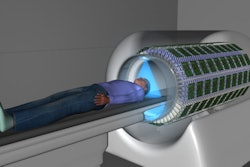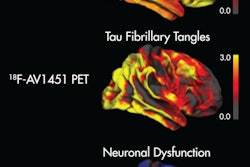Researchers are developing quite the novel way to acquire PET brain scans. Rather than placing a patient in a conventional scanner, he or she would wear a helmet outfitted with PET detectors, according to an article published August 22 on Smithsonian.com.
Researchers at West Virginia University have developed a prototype device for humans that is based on RatCap, a PET scanner worn on a rat's head. The goal is to create a device with a ring of small, square PET detectors that can acquire PET images while the subject is moving rather than positioned stationary in a whole-body scanner.
Potentially, the helmet could help in research investigating neurological disorders, such as Alzheimer's and Parkinson's diseases, or in diagnosing stroke. It also might allow the monitoring of brain activity while a person is laughing, exercising, experiencing stress, or in a virtual reality setting.
The researchers are collaborating with the University of California, Davis; the University of Washington; and GE Healthcare, in addition to receiving a $1.5 million grant to determine if the technology can work.




















